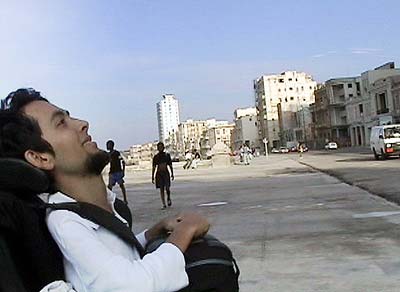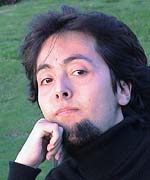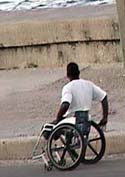 |
Vik Pineda getting some air on the boardwalk in Havana, during his documentary expedition in late 2001. (Gallagher Fenwick photo) |
UC Berkeley student Vik Pineda shines a personal spotlight on treatment of disabled people
BERKELEY - "There isn't anything I can't do," says Victor "Vik" Pineda, a UC Berkeley student in the city and regional planning master's program.
He's not bragging: as an undergraduate at Cal, he was elected an ASUC senator, founded a new student group, and completed a double major in business and Political Economy of Industrial Societies. He's made an award-winning documentary short film about life in Cuba, and is about to embark on a similar documentary venture about Serbia and Montenegro.
He is also changing the way the world views people with disabilities. Pineda has spinal muscular atrophy, a form of muscular dystrophy, and uses a wheelchair to get around. The disease has weakened his chest muscles, so he frequently needs a machine to help him breathe. Yet nothing seems to slow this guy down. If he had a bit more lung power, he'd probably talk 90 miles per minute instead of just 60. And he may spend all day in a chair, but he can make even a first-time acquaintance feel lazy.
Pineda's first film, "In Cuba, Disabled," looks at the treatment of people with disabilities in a socialist state that has universal healthcare. His next will examine how the disabled are treated in Serbia's postwar environment. In between working on films and going to school, Pineda spends a lot of time talking to influential people in the Department of Justice's Human Rights division and in the United Nations.
"When you think about it, everyone in the world is facing the same set of obstacles - how we develop our abilities and ourselves so that we can contribute to our family, our community, our country," says Pineda. "It doesn't matter what your challenges or obstacles are; we all have some. And this is how I contribute."
'There was no way I could fit in'
Pineda didn't always feel so confident. Born in Venezuela, he grew up with two brothers near Santa Ana in Orange County. His high school in Newport Beach was very clique-ish. "I didn't develop much in high school," he recalls. "There was no way I could fit in. I realized then that I had to make my own way, that I needed to make the most of what I had going for me."
That came a lot more easily when he left home for college. "I felt like an athlete when I got to UC Berkeley," marvels Pineda. "I had all these resources at my command: note takers, support staff. The whole infrastructure was laid out as barrier-free as you can get. I was finally empowered to develop my skills instead of being blocked by everyday challenges." There was a learning curve, however. Like any student living on his own for the first time, Pineda had to learn time and money management skills. But he also had to figure out how to be an employer, handling the hiring and payment of his full-time assistants, as well as firing them if necessary.
Pineda lived in the Unit One Residence Hall, and quickly made friends. They encouraged him to run for Residence Hall Assembly, and he became an executive vice president of Unit One his sophomore year. With that training and budgetary experience under his belt, Pineda decided to run for ASUC Senate the following year. At ASUC, he handled issues dealing with access to higher education and social justice and served on the budget board, helping allocate funds for the $2 million budget.
 'I felt like an athlete when I got to UC Berkeley. I had all these resources at my command: note takers, support staff. The whole infrastructure was laid out as barrier- free as you can get.' -Vik Pineda |
Pineda's efforts on behalf of people with disabilities have led to his national recognition as a spokesperson. The Assistant Attorney General for Civil Rights at the Department of Justice invited him to talk about the protection of civil rights and the enforcement of the Americans with Disabilities Act, and Pineda was appointed to the board of the National Council on Disability. "Berkeley has really given me persistence, self-confidence, and the knowledge that I have a lot of people behind me, from professors to counselors to a network of talented peers," he says. "It excites me to know that I can approach and engage people at the highest levels."
Feeling the bumps
Meanwhile, as an undergraduate Pineda had also begun working on what has become a documentary series he calls "Disabled Nations, Disabled Peoples," to highlight the challenges that these particular nations themselves face along with their most vulnerable citizens. He went to Cuba in December 2001 to film the first installment, "In Cuba, Disabled."
"I wanted to get out and see life from a different perspective and document it," he explains. "What is life like for a disabled Cuban? Does the system care for its people in a different way than the U.S. does? We don't have universal health care like Cuba does, but they have much more limited funds."
 View photos from Pineda's trip to Cuba |
As the resulting 10-minute documentary shows, Havana is not exactly set up for the disabled. The film opens with a montage of crumbling ice-cream-colored palaces, classic old cars, and vibrant street life, before showing a legless man in a wheelchair trying to overcome what looks like a 10-inch curb. Eventually the man climbs down from his wheelchair onto the sidewalk, struggles to lift it over the curb, and then climbs back in. Pineda faced the same difficulty, and says he did not enjoy the unfamiliar feeling of being 100 percent dependent on his friends to get around.
Brief as it is, "In Cuba, Disabled" paints a full picture of life for disabled Cubans. "I've always thought an image is the most powerful way to express an idea or feeling," says Pineda. "You have more power in relating experience. I wrote a report about visiting Cuba, but you can feel more of it in the 10 minutes of the film - the grime, the reality of it."
Cuba's socialist system guarantees the disabled quite adequate rehabilitation, health, and employment services, but they are kept entirely segregated from the rest of society. In his voice-over, Pineda recounts how after a few days the crew had to begin asking, "Where are all the disabled?" Few were on the streets; most were in rundown clinics or government-operated employment factories, for example, one in which blind people assemble disposable razors for the equivalent of 5 cents per razor.
To Pineda, this isolation prevents disabled Cubans from contributing fully to society. "You don't need to be taken care of by the government, you just need minimal support to develop your own skills," he says.
"In Cuba, Disabled" won a Merit Award at the 2003 Superfest, the International Media Festival on Disabilities. Pineda plans to screen it this week in Washington, D.C. at the National Disability Studies Conference, where he will be presenting. Afterward, he'll work with Venezuela's delegation to the United Nations on crafting "A Comprehensive and Integral Convention for the Protection of Rights and Dignity of People with Disabilities" that will be presented to the UN General Assembly next year.
Bring your own asphalt
On June 24, Pineda will fly to Belgrade, Serbia, to begin working on the second installment of "Disabled Nations, Disabled Peoples." This time he'll be accompanied by Heather Fells, a UC Berkeley student majoring in Peace and Conflict Studies and Disability Studies, and Patrick Atanassijer, a professional videographer. The crew has already established relationships with disability activists in Serbia as well as Serbian Ambassador Ivan Vujacic, and arrangements have been made for Serbian television stations to air the documentary once it is finished. The film is being funded in part by the Kujacic Endowment of Berkeley's Slavic Studies Department, and Pineda is still seeking additional financing.
"Disability is a complicated issue for Serbia," says Pineda. "The economy is in transition from socialist to capitalist, plus it's a postwar environment flooded with refugees, plus there are a lot of injured people with new disabilities, and a lot of sick people from the depleted uranium. How does a society adapt to these changes? How do you deal with these people?"
Even Berkeley, where the Disabled Students Movement started, was not always an oasis of sidewalk cut-ins, chirping crosswalks, and Braille signs. "In 1973 some guys in wheelchairs dragged bags of asphalt and poured it by the curb so they could get onto campus," Pineda recounts. "It's hard to imagine now, but the entire campus was surrounded by a curb - and the same thing was true all over the world, and in some places it still is."
He tells a recent tragicomic anecdote about Belgrade, where the government built beautiful new apartment buildings for disabled veterans. At the first press conference, the officials realized they had forgotten to put in wheelchair ramps, and sheepishly rescheduled the opening. At the second press conference, they handed a veteran keys to his new home, he proudly wheeled himself up the ramp - and then found that he couldn't get his chair through the too-narrow door.
"They had good intentions, but no thinking went into developing it," sighs Pineda. "It's an awareness issue, and it takes exposure and activism. There was a famous slogan for the disability rights movement, 'Nothing about us without us.' That's my role: to be a mediator and facilitator, bringing issues and exposing them so we can learn from them."
As Pineda sees it, the notion of disability is a socially constructed phenomenon.
Remove the obstacles and the "disability" fades away. "After
all, if I live in a land without steps, I am not mobility impaired. If television
is captioned and everyone knows sign language, I can communicate even if I
am deaf," he says. "If we can just create space for inclusion - through policy,
anti-discrimination laws, and environmental design standards - we start to
change society. People become more enlightened, and everyone is able to contribute."

